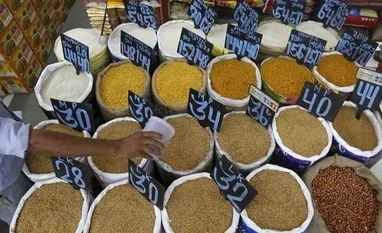Market regulator Securities and Exchange Board of India (Sebi) on Thursday barred launch of any fresh contracts in chana in the futures markets. It also asked the investors to wind down their existing positions. Total open interest in chana on NCDEX is 0.19 million tonnes as of Thursday. Chana futures prices have risen 17.37 per cent in the past one month and on Thursday it closed at Rs 6,812 per quintal on NCDEX. Chana price on NCDEX have gone up 55.85 per cent in the past three months.
At the same time, government imposed 20 per cent customs duty on sugar exports to boost domestic supply and ensure that traders don’t ship out sugar to take advantage of favourable international markets. This would improve supplies in the domestic market where the sweetener is trading at Rs 40 per kg. Earlier this month, the food ministry had recommended 25 per cent export duty on sugar to ensure smooth domestic supply. Global sugar prices have risen 53 per cent in the past six months to around 20 cents per pound due to delayed harvest of the Brazilian crop. Brazil is the world’s largest producer of sugar and competes with India in the international market.
The government has also decided to continue with the 25 per cent import duty on wheat for another three months. Wheat procurement has fallen due to sufficient stock in the warehouses. India’s wheat stocks in central pool by May end was estimated to be at 31.44 million tonnes.
| MEASURES TAKEN TO ARREST INFLATION |
|
However, with wheat procurement in 2016-17 season falling short of the target by almost 5 million tonnes, there was a talk that import duty might be abolished, but good stock position seems to have gone against that.
The government also asked central security agencies, including Intelligence Bureau and Directorate of Revenue Intelligence, to “pull up the socks” to curb cartelisation and ensure there is no artificial rise in prices of lentils. “I have asked all of them to pull up their socks and ensure that no artificial rise in pulses prices take place,” said Hem Pande, consumer affairs secretary. Officials have been told to keep a track of the entire supply chain of imported dals from shipment to final delivery point. The states have been told to sell tur and urad from the buffer stock at a subsidised rate of not more than Rs 120 per kg and chana at Rs 60 per kg.
In pulses, officials said it was decided at a high-level meeting chaired by Union cabinet secretary earlier in the day that 0.65 million of the expanded pulses buffer stock of 0.80 million tonnes would be filled largely through imports. For this, an option of growing pulses in African countries like Mozambique could be considered. “This would ensure that there won’t be any undue pressure on domestic supplies because of increased government purchases,” a senior government official said. A team of senior officials from the ministry of consumer affairs assisted by officials from department of commerce and agriculture experts would soon leave for Mozambique and Myanmar to explore the possibility of long-term pulses imports contracts.
As per Consumer Affairs Ministry data, maximum retail price of urad was at Rs 196 a kg, tur at Rs 166 a kg, moong at Rs 120 a kg, masoor at Rs 105 a kg and gram at Rs 93 a kg on Thursday.
As per official data, India’s consumer price-based inflation touched a 19-month high of 5.76 per cent in May 2016, driven primarily by food inflation. Retail food inflation or the consumer food price index rose 7.55 per cent, compared with 6.40 per cent in April and 4.80 per cent in May 2015.
Among the various food categories, pulses showed a staggering year-over-year increase of 31.6 per cent in May, with pulses inflation rising 28.2 per cent in urban areas and 33.6 per cent in rural areas year-on-year.
Production of pulses is estimated to have declined to 17.06 million tonnes in 2015-16 crop year (July-June) due to two consecutive years of drought, while the demand stands at 23.5 million tonnes.
With inputs from Rajesh Bhayani
)